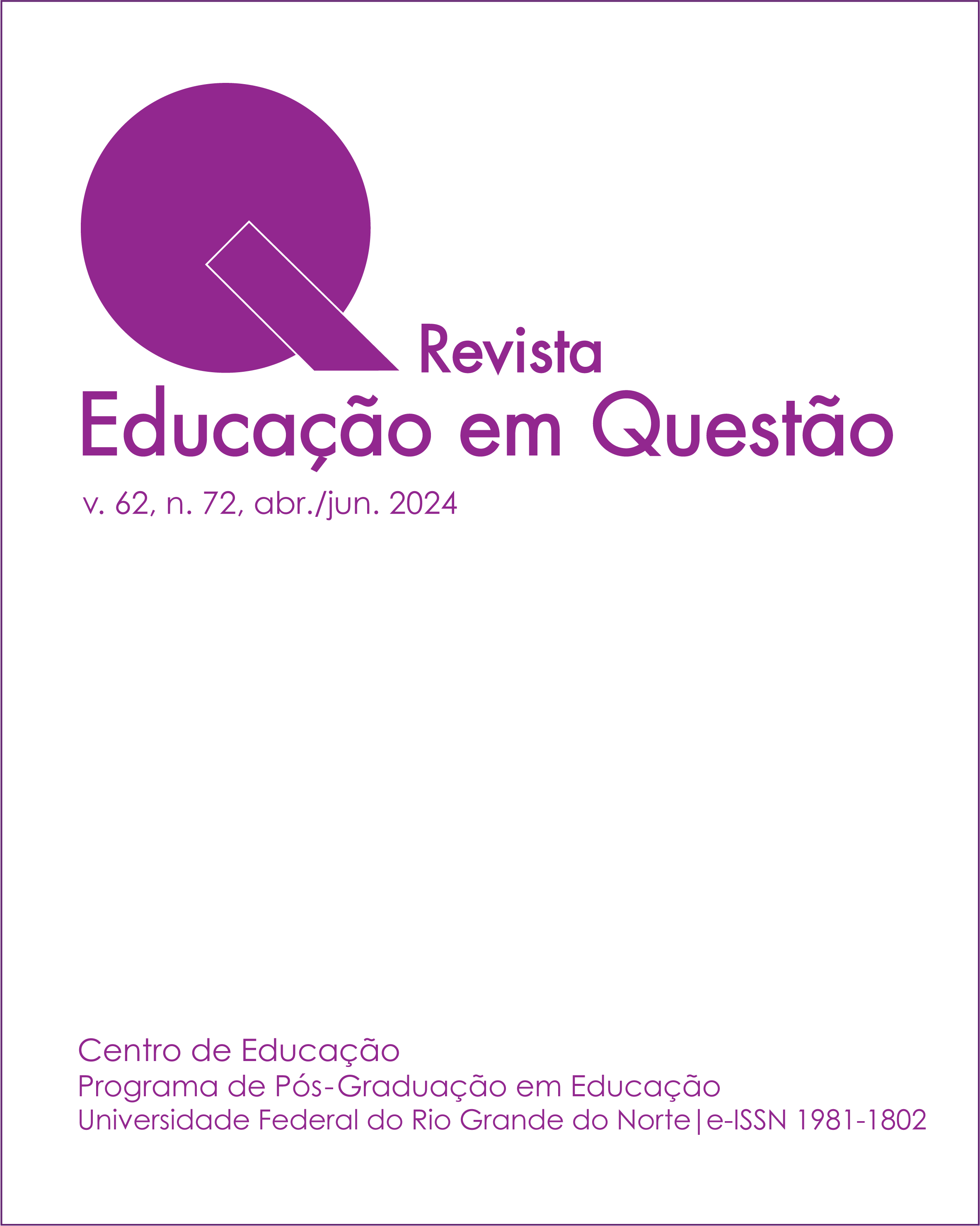Basis for thinking the artificial intelligence and school and organizational learning
DOI:
https://doi.org/10.21680/1981-1802.2024v62n72ID36032Keywords:
Artificial intelligence, Digital media, Education, Educational process, LearningAbstract
This essay aimed to highlight alerts and recommendations aimed at the use of artificial intelligence (AI) in educational, educational and organizational processes, considering its impacts through experiences and evaluations carried out and disseminated by studies analyzed by authors from institutions from Canada, China, South Korea, Denmark, Spain, United States, France, England, New Zealand, Russia and Brazil. It is characterized as a bibliographic descriptive essay, which was mainly based on the study by Chassignol; Khoroshavin; Klimova; Bilyatdinova (2018), and among other original research, the work of Shah (2023), focusing on the impacts of AI on education. We can only wait to see how the application of AI will be accepted in production and educational processes, to learn about the new responsibilities reserved for the human contingent. And without forgetting that even with the impactful benefits offered by AI, the humanized role of the teacher cannot yet be passed over in the educational process.
Downloads
References
APPEN. Relatório anual sobre o estado da IA da Appen – 2021. Disponível em <https://appen.com/press-release/2021-state-of-ai/> Acesso em: 3 set. 2023.
BIDARRA, José; SIMONSEN, Henrik Kohler; HOLMES, Wayne. Artificial intelligence in teaching (AIT): a road map for future developments. Comissão Europeia, 2020. Disponível em: <https://www.researchgate.net/publication/ 342214907_Artificial_Intelligence_in_Teaching_AIT_A_road_map_for_future_developments>. Acesso em: 3 set. 2023.
CHASSIGNOL, Maud; KHOROSHAVIN, Aleksandr; KLIMOVA, Alexandra; BILYATDINOVA, Anna. Artificial intelligence trends in education: a narrative overview (Tendências da Inteligência Artificial na educação: um panorama narrativo). Procedia Ciência da Computação, v. 136, p. 16-24. 2018, Disponível em: <https://www.sciencedirect.com/science/article/pii/ S1877050918315382> Acesso em: 3 set. 2023.
CHEN, Lijia; CHEN, Pingping; LIN, Zhijian. Artificial intelligence in education: A review. Ieee Access, v. 8, p. 75264-75278, 2020. Disponível em: <https://ieeexplore.ieee.org/ abstract/document/9069875> Acesso em: 3 set. 2023.
COMENIUS, Iohannis Amós. Didáctica Magna. Fundação Calouste Gulbenkian. eBooksBrasil.com. 2001. Disponível em: <https://www2.unifap.br/edfisica/ files/2014/12/A_didactica_magna_COMENIUS.pdf> Acesso em: 20 maio 2023.
DENES, Gyorgy. Um estudo de caso do uso de IA para previsão de notas do Certificado Geral de Educação Secundária (GCSE) em uma escola independente seletiva na Inglaterra. Computers and Education: artificial intelligence. 2023. (v. 4). Disponível em: <https://www.sciencedirect.com/ science/article/pii/S2666920X23000085> Acesso em: 3 set. 2023.
GIL, Antonio Carlos. Como elaborar projetos de pesquisa. 5. ed. São Paulo: Atlas, 2010.
GONSALES, Priscila. Inteligência artificial, educação e pensamento complexo: caminhos para religação de saberes. 2022. Dissertação (Mestrado) – Programa de Estudos Pós-Graduados em Tecnologias da Inteligência e Design Digital. Pontifícia Universidade Católica de São Paulo. São Paulo: 2022.
HUTCHINS, David. AI boosts personalized learning in higher education. EdTech, 2017.
KING, Michael, CAVE, Richard, FODEN, Mike, STENT, Matthew. Personalised education: from curriculum to career with cognitive systems. IBM Education, 2016.
KÖCHE, José Carlos. Fundamentos de metodologia científica: teoria da ciência e iniciação à pesquisa. Petrópolis, RJ: Vozes, 1997.
MA, Wenting; ADESOPE, Olusola; NESBIT, John; LIU, Qing Liu. Intelligent Tutoring Systems and Learning Outcomes: a Meta-Analysis. Journal of Educational Psychology. American Psychological Association, 2014. Disponível em: <https://www.apa.org/ pubs/journals/features/edu-a0037123.pdf> Acesso em: 3 set. 2023.
MARTIN, Brent; KIRKBRIDE, Tracy; MITROVIC, Antonija; HOLLAND, Jay; ZAKHAROV, Konstantin. An intelligent tutoring system for medical imaging. (2023). Disponível em: <https://ir.canterbury.ac.nz/server/api/core/bitstreams/ 424b9572-44d0-44cb-bf6d-62da20c4db49/content> Acesso em: 3 set. 2023.
MARTÍNEZ, Miguel; RIGUEIRA-DÍAZ, Xurxo; LARRAÑAGA-JANEIRO, Ana; MARTÍNEZ-TORRES, Javier; OCARRANZA-PRADO; KREIBEL, Denis. Impacto da inteligência artificial nos métodos de avaliação na educação primária e secundária: revisão sistemática da literatura. Revista de Psicodidática, v. 28, n. 2,. p. 93-103, jul./dez. 2023. Disponível em: <https://www.sciencedirect.com/science/article/abs/pii/ S1136103423000114> Acesso em: 1º set. 2023.
MORIN, Edgar. Introdução ao pensamento complexo. Tradução Eliane Lisboa. Porto Alegre: Sulina, 2011.
MORIN, Edgar. Ensinar a viver: manifesto para mudar a educação. Tradução Edgard de Assis Carvalho e Mariza Perassi Bosco. Porto Alegre: Sulina, 2015.
NEWTON Cassey. Can AI fix education? We asked Bill Gates. The Verge. 2016. Disponível em: <https://www.theverge.com/2016/4/25/11492102/bill-gates-interview-education-software-artificial-intelligence> Acesso em: 3 set. 2013.
PIMENTEL, Mariano; CARVALHO, Felipe. Implicações e teorizações dos usos das IA generativas na educação. Revista Cult. p. 20-22, set. 2023 (Dossiê Inteligência artificial). Disponível em: <https://revistacult.uol.com.br/home/ia-generativas-educacao/> Acesso em: 5 set. 2023.
SHAH, Priten. AI and the future of education − teaching in the age of artificial intelligence (IA e o futuro da educação − ensinando na era da inteligência artificial). Hoboken/New Jersey: Jossey-Bass; John Wiley & Sons, Inc., 2023.
SUETH, Robson; FERRAZ, André. AISPA − Avaliação intersubjetiva, simétrica e pluridimensional da aprendizagem na perspectiva habermasiana do agir comunicativo. In: SILVA, Américo Junior Nunes da; SOUZA, Ilvanete dos Santos de; LIMA, Reinaldo Feio Lima (org.). Educação e a apropriação e reconstrução do conhecimento científico. Ponta Grossa: Editora Atena, 2020 (v. 2).
TABLEAU.COM. Disponível em: <https://www.tableau.com/data-insights/ai/ advantages-disadvantages#:~:text=The%20next%20disadvantage%20of%20AI,in %20any%20overly%20artistic%20field> Acesso em: 3 set. 2023.
VERGARA, Sylvia. Metodologia de pesquisa em administração. 4ed. São Paulo: Atlas, 2010.
WANG, Dongqing; HAN, Hou; ZHAN, Zehui; XU, Jun; LIU, Quanbo; REN, Guangjie. A problem solving oriented intelligent tutoring system to improve students’ acquisition of basic computer skills. Computers & Education. 2015. Disponível em: <https://www.sciencedirect.com/science/article/abs/pii/S0360131514002231> Acesso em: 3 set. 2023.
Published
How to Cite
Issue
Section
License
Copyright (c) 2024 Journal Education in Question

This work is licensed under a Creative Commons Attribution-NonCommercial-ShareAlike 4.0 International License.
The Journal Education in Question shall retain the copyright in all articles that it publishes.
The authors and co-authors of articles and book reviews, published in the Journal Education in Question, shall wait for at least 1 (one) year before they are allowed to submit new works for publication.






